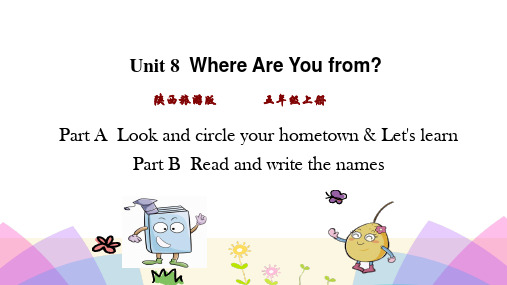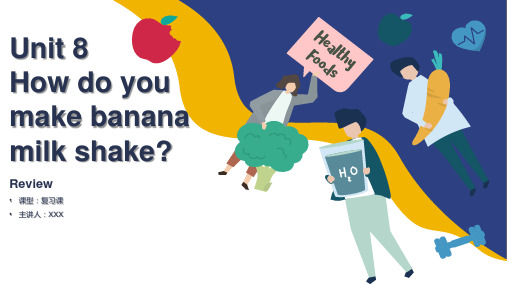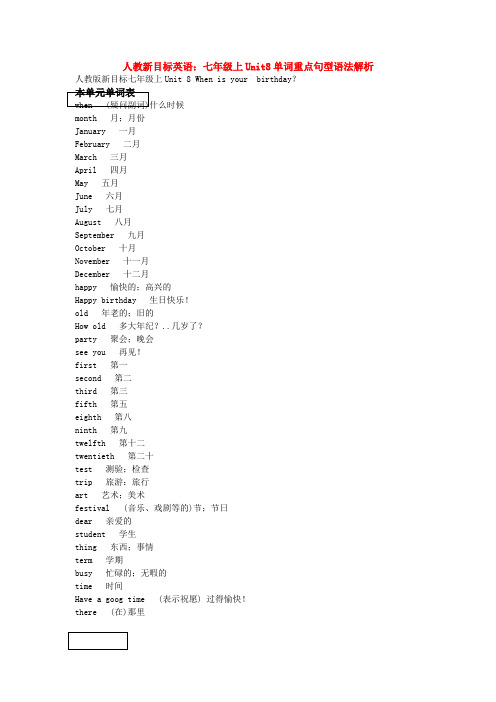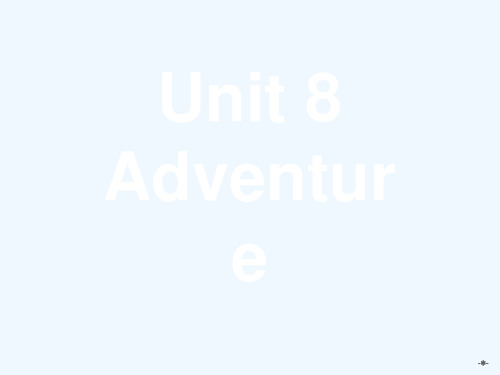旅游英语Unit 8 C
旅游英语作文

旅游英语作文【精品】旅游英语作文汇总10篇在学习、工作或生活中,大家都经常看到作文的身影吧,作文是经过人的思想考虑和语言组织,通过文字来表达一个主题意义的记叙方法。
相信许多人会觉得作文很难写吧,下面是小编为大家收集的旅游英语作文10篇,希望能够帮助到大家。
旅游英语作文篇1Today I go to Thailand with my mom.The first day we go to Shenzhen by airplane. Then we fly to Bangkok. At night we stay at Bangkok airport. I hate the airport so much, because it’s very cold, and I can’t sleep.The second day I go to Kraby by airplane. Then we go to Lanta Island by by car. We stay at a good hotel. There is a big swimming pool by the sea. When I swim in the swimming pool, I can see the sea. It’s very blue and clear.The third day I go to snorkeling in Koh Ngai, Koh Ngai is a very beautiful and small island. When I snorkeling, I see a lot of fish they are very beautiful and cute. And I see a small shark, I am scared. I love snorkeling.The forth day I go to the south of the Lanta Island. We eat lunch on a mountain, and there is a telescope, I can see the sea and the town with the teles cope, and it’s very beautiful. After lunch we set on the car go to the south of the island. The driver’s grandma and grandpa are Chinese, they com to Lanta Island long time ago. But the driver only can speak English, he can’t speak Chinese. When we arrive there, the driver introduces us a cheap hotel, the room with fan just 300 baht per night. We stay here for 3 nights.The fifth day I stay at the south of the island. I play with thesands all day. And I make a sand tower, it’s tall and strong. At eleven o’clock, a person kicks my tower, and it’s broken. In the afternoon I make a big and splendid sand castle. And I make a sand person in the castle, and I say he is the president.The sixth day I go to snorkeling in Koh Rok, and we go there by long tail boat. The boat is small and long. I set in front of the boat. The eave is very big, and sometimes I feel I am flying. I am so scared. When we arrive there, the scenery of the island is amazing. Then I jump in the water to snorkeling. I see sea grass corals and a lot of fish. And I see a lot of Nimo live in corals. Fish are beautiful and cute.……旅游英语作文篇2Last summer vacation,my family and I went to Qingdao by train.There was always sunshine and fresh air,which made us so comfortable.We went to the seaside,the sea was as blue as the sky,and bathing in the sunshine on the beach, was really an enjoyable thing.I also picked up a lot of colorful shells with my little sister.There we bought many interesting souvenirs,I was planing to send them to my friends.We ate many tings there,such as fish,prawn,and so on.They are very delicious.Then we lived in a clean and tidy hotel,and the price was not so expensive.I like Qingdao very much,and if I got a chance,I hope to come here again,it is such a beautiful and interesting place.翻译:上个暑假,我和我的家人坐火车去了青岛。
陕旅版五年级英语上册Unit 8 Where Are You from 单元课件【完整版】

⑤France /frɑːns/(名词)法国
【例句】I come from France. 我来自法国。 【拓展】French(形容词)法国的;法语的;法国人的 (名词)法国人;法语
重难点探究
重点词汇
⑥Australia /ɒˈstreɪliə/(名词) 澳大利亚
【例句】Lisa comes from Australia. 莉萨来自澳大利亚。 【拓展】Australian(形容词)澳大利亚的;澳大利亚人的 (名词)澳大利亚人
课文原文 Read and write the names
课文原文 Read and write the names
Helen
Fiona
Jim
课堂互动 照样子说句子:
Hi, I’m Helen. I am from the USA. I like singing.
巩固练习 一、看图片,写单词。
USA city
hotel Australia
巩固练习
二、根据首字母提示或图片填空。
1. Do you want to v_i_s_it_____ Beijing?
2. This
_h_o_t_e_l is very good.
3. The
_U__S_A__ is very big, too.
4. I come from
重难点探究
重点词汇
②city /ˈsɪti/(名词)城市
【复数形式】cities 【例句】This is a city. 这是一座城市。 【对应词】village 村庄 【形近词】pity 同情;遗憾
重难点探究
重Hale Waihona Puke 词汇③hotel /həʊˈtel/(名词) 宾馆
Unit 8 (单元复习课件)-八年级英语上册(人教版)

二、词组归纳
11.一杯酸奶 ____o_n__e_/_a__c_u_p__o__f_y_o__g_u_r_t 12.还有一件事 _____o__n_e__m__o__re__t_h_i_n_g__ 13.牛肉面条 ____b__e_e_f__n_o_o__d_l_e_s_____ 14.做水果沙拉 _____m__a_k_e__f_r_u_i_t_s_a__la_d__ 15.把……放进……里面 _____p_u__t_.._.i_n_/_i_n_t_o_._..____ 16.传统食物 ___t_r_a_d__it_i_o_n__a_l_f_o_o__d___ 17.一片面包 ____a__p_i_e_c_e__o__f_b__re__a_d__ 18.一个特殊的日子 _____a__s_p_e_c__ia_l__d_a_y_____ 19.感恩;感谢 _____g_i_v_e__t_h_a__n_k_s______ 20.做菜 _____m__a_k_e__d__is_h__e_s_____
watermelon
7. ____________n. 西瓜
spoon
8._____________n.__v. 增加;添加 10. __f_i_n_a_l_l_y____adv. 最后;最终 11. __s_a_l_t_______n. 食盐 12___s_a_l_t_y_____adj. 咸的 13. __s_u__g_a_r_____n. 食糖 14. __c_h__e_e_s_e____n. 干酪;奶酪 15. __m__a__c_h_i_n_e__n. 机器;机械装置 16. __h__o_l_e______n. 洞;孔;坑
四、重点知识
Cut up the bananas. 切碎香蕉。
英语听说训练(高职旅游类旅游管理专业)unit8Travelling

Warming-up Questions for discussion You are going to talk about travelling. Read the following
questions and discuss them with your partner. Do you like travelling? Why? Where is your ideal place to travel? What preparations do you need to do before travelling? Which is your favorite transportation to travel? Which one would like, travel in groups or travel along?
Dialogue 4
Guest:
, please.
Receptionist: Do you have a reservation, sir?
Guest:
No, I’m sorry, I don’t.
Receptionist:
Well, I’d like to help you,
.
Guest:
I see. In that case,
Traveler: About
.
Officer:
Well, everything seems to be OK. Please go t
o
next.
Traveler: Thank you.
Dialogue 3
Guest: Waiter,
, pleases!
Waiter: Just a moment, sir. … Here is the bill. It is 158 Yuan.
人教新目标英语:七年级上Unit8单词重点句型语法解析

人教新目标英语:七年级上Unit8单词重点句型语法解析人教版新目标七年级上Unit 8 When is your birthday?month 月;月份January 一月February 二月March 三月April 四月May 五月June 六月July 七月August 八月September 九月October 十月November 十一月December 十二月happy 愉快的;高兴的Happy birthday 生日快乐!old 年老的;旧的How old 多大年纪?..几岁了?party 聚会;晚会see you 再见!first 第一second 第二third 第三fifth 第五eighth 第八ninth 第九twelfth 第十二twentieth 第二十test 测验;检查trip 旅游:旅行art 艺术;美术festival (音乐、戏剧等的)节;节日dear 亲爱的student 学生thing 东西;事情term 学期busy 忙碌的;无暇的time 时间Have a goog time (表示祝愿) 过得愉快!there (在)那里单词解析1.other【解析】①作形容词,意为“别的,其他的”,其后接可数名词复数或不可数名词。
What other activities do you like?你喜欢其他什么活动?②比较the other,another,others的用法。
the other:意为“(两者中的)另一个”,常与one连用,构成one……the other 结构,意为“一个……另一个”。
I have two rulers. One is black and the other is white.我有两把尺子,一把是黑色的,另一把是白色的。
another:意为“又一(的);再一(的)”,可作限定词或代词,泛指三个或三个以上同类中的另一个人或物。
others:意为“其他的人或事物”,表示泛指,作代词,后不加名词。
旅游英语第八章

9
8
4
7
5
6
Seating arrangement in Western banquets
1 2 3 4 5
10
9
8
7
6
Seating arrangement in Western banquets
1 2 3 4 5
11
12
10
9
8
7
6
Table Manners
Dining Room Utensils and Tableware
凡进食之礼,左殽右胾。食居人之 左,羹居人之右。脍炙处外,醯酱处内, 葱渿处末,酒浆处右。
Table arrangement in Chinese banquets
Four tables
Five tables
Six tables
Seating arrangement
Seating arrangement in Chinese banquets
• 桌布 • 餐巾 • 毛巾
• tablecloth • napkin • hቤተ መጻሕፍቲ ባይዱnd towel
• 座位巾
• 台裙
• service cloth
• table skirt
• 纸巾
• tissue
The position of knife and fork
• • • •
table service self-service counter service carryout
• 餐桌服务
• 自助服务 • 柜台服务 • 外卖
Eating Etiquette between China and America
北师大版高中英语必修3 Unit 8《Adventure》(Warm-up)ppt课件

Warm-up & Lesson 1 Adventure Holidays
C.What you should take with you.
D.What services you will be offered.
5.The passage is most likely
.
A.a science report
B.an advertisement
C.a piece of news
jumping include jumping from tall buildings and diving into the sea from the top of high mountains.
C 晨读晚诵 HENDUWANSONG
Y 预习导引 U XI DAO YIN
H 核心归纳 E XIN GUI NA
C 晨读晚诵 HENDUWANSONG
Y 预习导引 U XI DAO YIN
H 核心归纳 E XIN GUI NA
导读诱思
1.Why do people take part in dangerous sports such as bungee jumping?
答案:Because people want to get immediate excitement from these risky sports. 2.What activities are as dangerous as bungee jumping?
小学六年级英语上Unit 8 A trip to Hong Kong

Unit 8 A trip to Hong Kong【单词回顾】迪士尼公园__________ 米老鼠__________ 唐老鸭_________ 后来_________ feel的过去式_________ 直到________ 更好的________ 惊讶的_________ sit的过去式__________一、短语:go on a trip, by train, take a photo…二、句子:1. Ben sat with me until I felt better.2. Ben said he was very excited because it was his first visit to the island.3. We all hope the trees will grow well.三、重点精析:1. I went on a trip to Hong Kong. 我去香港旅游了。
辨析:journey, travel, trip的区别1)journey指从一地到另一地,通常指陆地上的远距离“旅行”,有时也可以表示经常走的或长或短的“路程”。
只作名词。
如: I took a journey from Beijing to Shanghai last year.- - How long is your journey to school? --Only about 10 minutes.2) travel作“旅行、游历”解,一般表示从一地到另一地旅行这一总的概念。
常指长时间、远距离的“旅行”。
尤指出国旅行。
可作动词和名词。
其复数形式意思为“旅游笔记”、“游记”。
如: At present, many people are fond of travel in their spare time.3)trip 一般指时间短、距离近的“旅行、远足”,也可以指长途旅行。
在非正式用语中可代替journey。
- 1、下载文档前请自行甄别文档内容的完整性,平台不提供额外的编辑、内容补充、找答案等附加服务。
- 2、"仅部分预览"的文档,不可在线预览部分如存在完整性等问题,可反馈申请退款(可完整预览的文档不适用该条件!)。
- 3、如文档侵犯您的权益,请联系客服反馈,我们会尽快为您处理(人工客服工作时间:9:00-18:30)。
I. Text
7 Drink only when there is no food in your mouth. It is bad manners to take a mouthful of food and then wash it down with a gulp of water. Be sure your lips are not greasy when you drink from your glass. Try not to get your lips greasy. If you do, you have your napkin to wipe them with. 8 Try not to get into your mouth anything that will have to be taken out. But if you have a small bone or some other object you cannot swallow, remove it in a way that will not be noticed. If you are eating with a spoon, take it in the spoon from your mouth to the plate; if not, use your hand. Do not spit anything from your mouth on to the plate or on to the floor.
II. Exercises Choose the Best Answers According to Text C.
1. Which action is proper when the guest uses the table napkin? A. If the hostess picks up her napkin, the guest s lap. B. If a roll of bread is wrapped in the napkin, the guest should take it out and put it on the table. C. If the napkin is large, the guest should unfold it completely. D. If the napkin is small, the guest had better leave it folded double on the table. 2. It is polite behavior for a guest to . A. actively talk when eating at the table B. put down the knife and fork after finishing eating C. enjoy eating slowly at the end of the meal D. stay at his or her seat until the host leaves the table
I. Text
9 Be careful not to drop any food or water on the tablecloth. If you have an accident, do not do anything which will make others notice it; but always apologize quietly to the hostess. You might say, "Oh, I am so sorry, I was very careless." 10 Do not make any noise when you eat. It is bad manners at a Western meal to make any noise with the mouth. And if you have to cough or choke, use your napkin to cover your mouth. 11 Avoid cleaning your teeth at the table or anywhere in public, with your finger or with your tongue. If you have to get something out that is caught between your teeth, cover your mouth with your napkin while you do so, but it is better to leave it until you are alone sometime later.
I. Text The Table Napkin 2 As soon as the hostess picks up her napkin, pick yours up and lay it on your lap. Sometimes a roll of bread is wrapped in it; if so, take it out and put it on your side plate. If the napkin is large, leave it folded double on your lap; if small, unfold it completely. When You Finish a Course 3 As in Chinese etiquette, the hostess tries to keep eating as long as the slowest guest. A thoughtful guest will try to eat neither too fast, so as to seem to gobble, nor too slow, so as to keep others waiting. And when he has eaten all he intends to eat, he should lay down his knife and fork, or his spoon, as the case may be, with a final air, so that his hostess is in no doubt as to whether he has finished or not.
Text C
Table Manners
I. Text C II. Exercises III. Chinese version of Text C
I. Text
Table Manners
1 From the time when our caveman ancestors chewed on their wild-pig bones in front of their fire to our own day when we sit around a table spread with a snowy table cloth and shining silver, we have the history of the change in eating habits from the simple satisfaction of hunger to the meal as a delightful, if rather complex, social institution. When you are invited to dinner today, it is assumed that you will be more interested in the persons and conversation at the table than in the meal itself. Therefore, leisurely eating habits should be cultivated, allowing for conversation and pleasantries at the same time. The actual eating ought to be done with as little noise and movement as possible.
I. Text
Various Rules and Suggestions 5 Sit up straight on your chair; do not lean heavily against the back. Never tilt the chair backward on two legs. You may lean the body slightly forward when you eat, but never lower the head down toward the plate. Your arms should be held close to your sides, so as not to touch the person next to you and they should not rest on the table when you are eating. 6 Do not put much food in your mouth at a time. Keep your lips closed while you are chewing. And as long as there is food in your mouth, do not try to talk.
II. Exercises
3. From the passage we can learn as guests it is courteous to . A. leave the table a little bit earlier than the hostess gives the signal of ending B. continue chatting at their seats if they like after the meal C. ask the hostess to excuse no matter who has to leave the table during the meal D. wash down a mouthful of food with a gulp of water 4. Which decent sitting posture does the author indicate in Para. 5? A. Leaning the body heavily against the back of the chair. B. Tilting the chair backward on two legs. C. Sitting up straight on the chair. D. Resting the arms on the table when eating.
